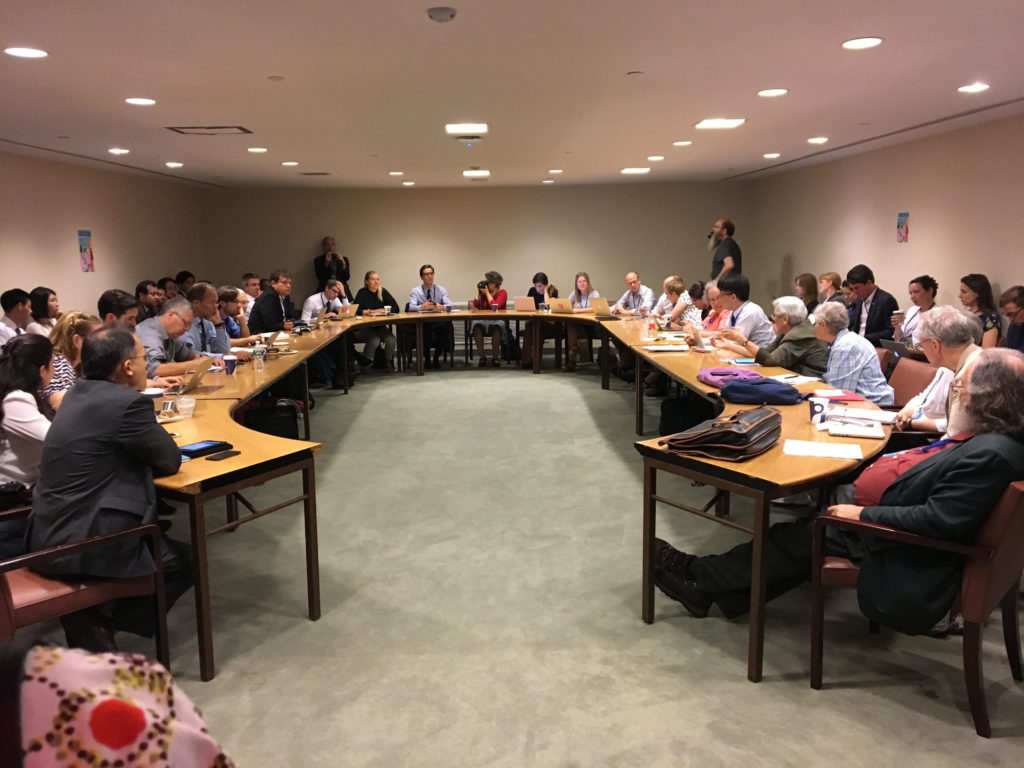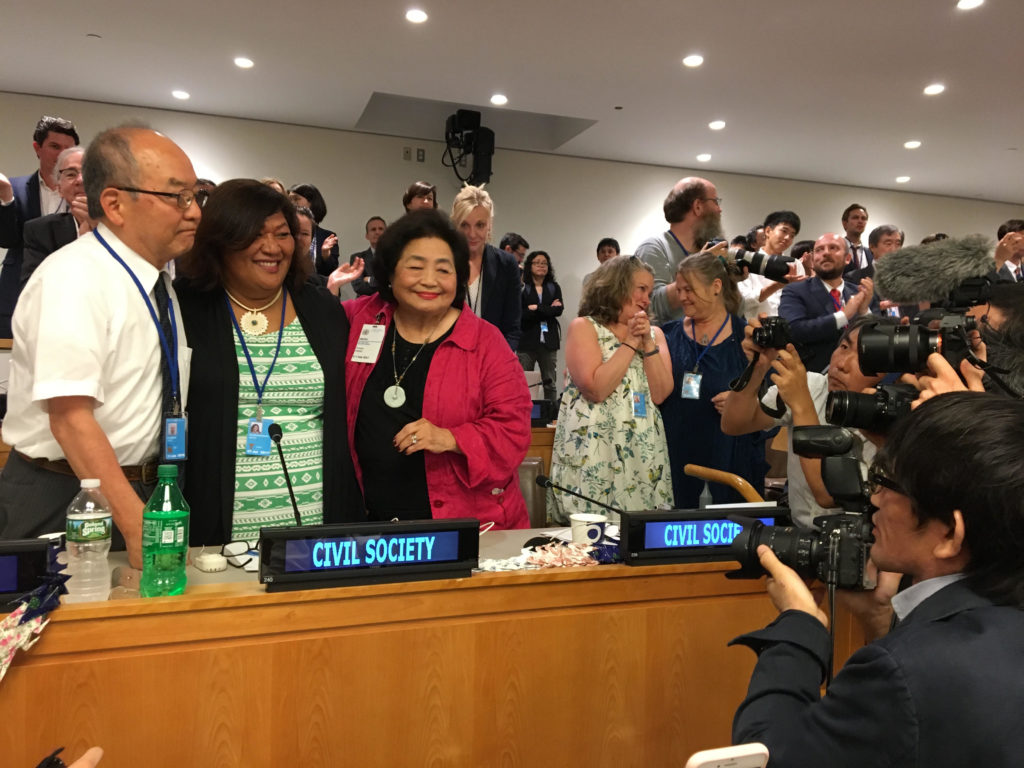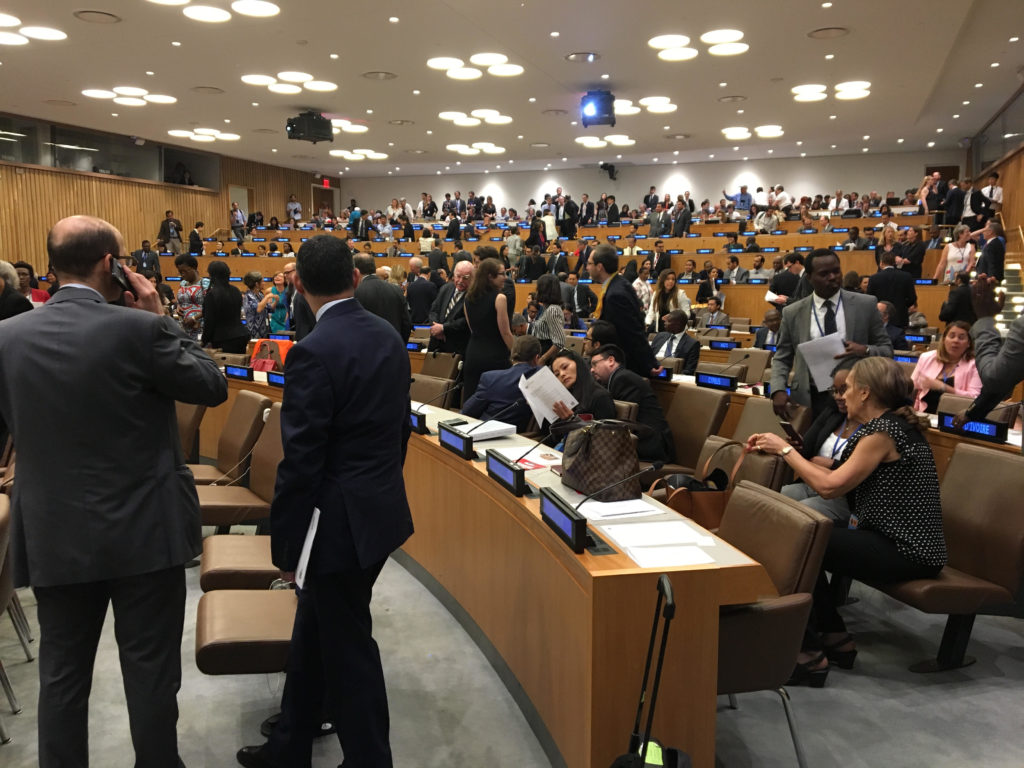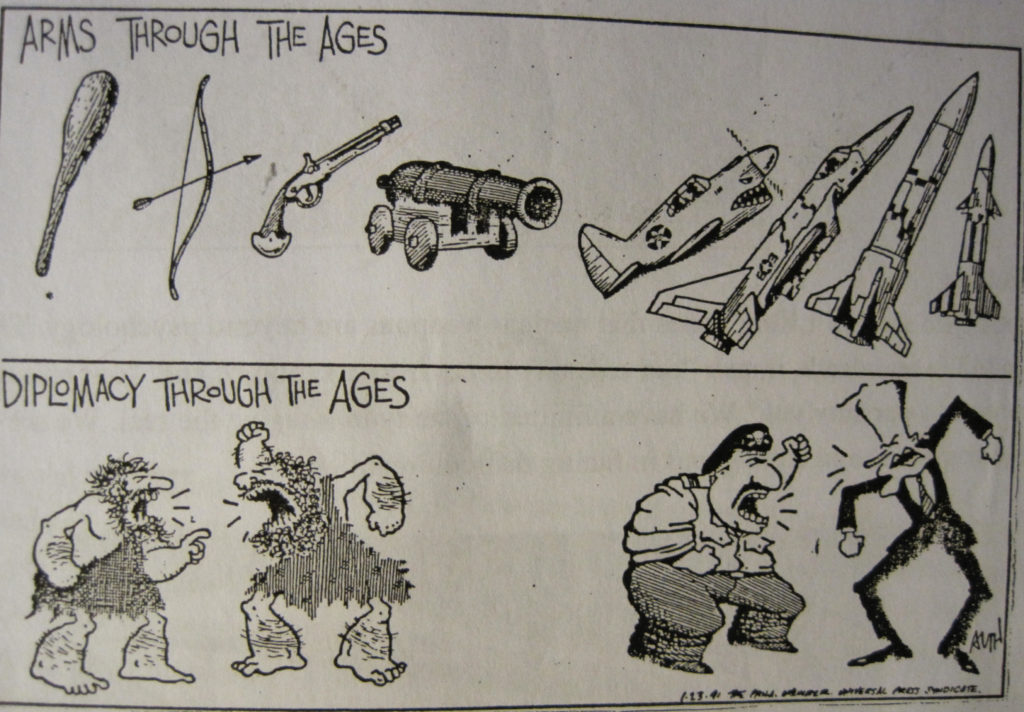North Korea: Quantum Politics, the TRANSCEND Method and Second Order Change
EDITORIAL, 9 Oct 2017
#502 | Diane Perlman, Ph.D. – TRANSCEND Media Service
The International Campaign to Abolish Nuclear Weapons (ICAN) just won the Nobel Peace Prize. I am on the Global Council of Abolition 2000, a member of ICAN, instrumental in the Nuclear Ban Treaty, I wrote about last week HERE.

At the 3 week negotiations for a Treaty on the Prohibition of Nuclear Weapons July 6, 2017, ICAN meeting of civil society at our UN conference room, preparing for the approval of the Treaty on July 7.
July 7, after approving the Ban Treaty, joy and gratitude:
ICAN promoted the Humanitarian Consequences Initiative (HCI), a turning point in stagnated 47-year-old Nuclear Nonproliferation Treaty (NPT) Process, which led to the Ban Treaty.
Virtually no one is addressing the underlying causes, including war itself. We can pioneer the next frontier – an initiative addressing underlying causes, highlighting the concept of “second order change” to accelerate the evolving body of work towards replacing war and transcending nukes.
The Ban Treaty shifts collective dynamics. The Nobel Peace Prize magnifies this by quantum leaps, opening the door wider for us to enter.
Please comment and share your ideas about ways we can do more good.
Aha! Moments
I remember my Aha! moment when discovering the TRANSCEND method of transforming conflicts, like my “Aha!” learning the concept of “Second Order Change” in family therapy and systems theory. Rather than treating the symptom (eliminating nuclear weapons), you treat the relationship system, the underlying conflict. See the nine-dot problem HERE from the book Change: the principles of problem formation and problem resolution, Watzlawick, P.,Weakland, J., & Fish, R..1974
These ideas instantly opened up of a new category of thinking and possibilities for solving problems, simply explaining a compelling, promising, and self-evident phenomenon, like learning something I didn’t know that I already knew.
Hypocognition
Recently, I discovered a concept about not having enough concepts. Reading cognitive linguist George Lakoff’s work on framing, I discovered “hypocognition,” another Aha. It means low thinking, the inability to see things or have ideas for which we have no language or framework.
“Hypocognition,” was coined by Robert Levy, psychiatrist and anthropologist. He observed people in Tahiti with no words for “grief” and “sorrow,” necessary to express human experiences. Instead, people described themselves as feeling “sick” or “strange” afterwards.
Dominant thought forms shape thinking and feeling in ways that limit ideas about what is possible. We need words, frames, concepts and categories that allow us to imagine transformative solutions.
The Belief in Coercion
The US mindset, among others, emphasizes egocentric, one-sided rhetoric, policies, tactics and strategies that embrace coercion – pressure, punishment, sanctions, isolation, threats, deterrence and violence. They do not consider knowledge about conditions under which coercion provokes escalation– akin to political malpractice. Johan Galtung has written about the “Naïve theory of sanctions.”
Claiming diplomacy doesn’t work with “those people,” they can’t be trusted, and only understand “force,” we apply more and more pressure. Pundits forget or misrepresent the successes of the negotiated Agreed Framework under Clinton in halting NK’s nuclear program and improving relations, which deteriorated when Bush called them the “axis of evil” and threatened them.
Now, in tit-for-tat escalation, threats, provocative military exercises and severe sanctions are followed missile and nuclear tests. Kim’s behavior is anything but unpredictable.
TRANSCEND Method
TRANSCEND provides a methodology for “second order change,” offering viable, creative solutions to problems that seem insurmountable.” It is more attractive and sustainable than “conflict resolution” and compromise in which both parties feel dissatisfied.
“Conflict transformation” creates a new reality that includes and transcends the needs and goals of both parties, using analysis, diagnosis, prognosis and therapy to bridge incompatible goals, to identify legitimate goals of basic human needs for safety, respect, dignity, identity and sovereignty.
For example, Johan Galtung transformed an eight-year conflict between Peru and Ecuador over land, by creating an international peace park that would benefit both countries.
Reframing: from Hypogocnition to Benecognition™
We can correct for hypocognition, by teaching new ways of thinking, and demystification of flawed concepts. I coined “Benecognition™” meaning beneficial thinking, language, frames, and concepts that increase options for creative solutions, and hopefully “Ahas.” Here are some examples.
- From Newtonian Politics to Quantum Politics
“Hard power,” “soft power,” and “smart power “- carrots and sticks – are Newtonian, dealing with physical forces and reactions. Joint military exercises, perceived as rehearsals for decapitation, UN sanctions, “fire and fury” rhetoric, provoke testing of missiles and bombs, not backing down.
Quantum physics, a deeper theory of nature, deals with subatomic energy and fields. Quantum Politics understands complexity, unseen forces, psychology, perspective taking, empathy and deep cause and effect, including time, history and memory of past trauma and the need for healing.
- The Law of Opposites and the Security Dilemma
Coercive policies produce blowback. Absorbed by our own security needs, we overlook how our actions provoke destabilizing insecurity, fear, moral outrage, defiance, mistrust, vulnerability, feelings of inferiority and humiliation in others.
Gripped by emotions and short-term, superficial, black-and-white, concrete thinking, politicians use approaches that escalate.
- Enemies and a Political “Heisenberg Insecurity Principle™”
In physics, the Heisenberg Uncertainty Principle states that one cannot observe a phenomenon without accounting for the effect of the observer. Light appears as either a particle or a wave, depending on how we set up the experiment.
My “Political Heisenberg Insecurity Principle” beyond the “bad guy” mentality, understands that our actions, rhetoric and strategies influence whether an enemy, Kim Jong un, appears as static (particle) or dynamic (wave), depending on how we set up the “experiment,” whether we induce fear, humiliation and back into a corner, or reassurance and respect.
- Reducing fear and its reasons
People are more dangerous when afraid, as are we. When afraid, people regress and may act impulsively. Psychologist Ralph K. White said, “The Madness that is carrying the world closer and closer to nuclear war has at its core a psychological explanation:
Each side, though fundamentally afraid, misperceives the nature of the danger it faces. Each side imagines that it faces an inherently, implacably aggressive enemy, when it actually faces an enemy as fearful as itself – an enemy driven mainly by fear, to do the things that lead to war.” (Fearful Warriors.)
- Humiliation versus a Face-Saving Way Out
During the Cuban Missile Crisis, the Kennedy brothers recognized the need to act respectfully and allow a face-saving way out. We cannot underestimate the destructive power of envy and humiliation, a cause of violence. Humiliation carries a narcissistic wound that contains an implicit demand for rectification to restore dignity.
NK Foreign Ministry official Ri Yong Pil told Evan Osnos,
“We are small in terms of people and area, but in terms of dignity we are the most powerful in the world. We will die in order to protect that dignity and sovereignty.”
- Graduated Reciprocated Initiatives in Tension Reduction (GRIT)
GRIT is a strategy that creates an arms race in reverse, described by Charles Osgood. One side unilaterally initiates tension-reducing moves to be reciprocated, ratcheting down tensions, building “an atmosphere of mutual trust within which negotiations on critical military and political issues can have a better chance of succeeding.”
- Beyond Deterrence to Spiral Theory
Deterrence, a theory, can break down under certain conditions and flip into spiral dynamics. Political psychologist Richard Ned Lebow states, “Deterrence can provoke the very behavior it seeks to prevent.” Ralph K. White, who wrote about empathy for the enemy (USSR), claimed deterrence works best when accompanied by drastic tension reduction.
Threatened parties will desire their own “deterrent,” believing that possessing the world’s greatest means of destruction means that you will be taken seriously. NK Minister Ri Yong Pil, also told Evan Osnos “The United States is not the only country that can wage a preventive war.” We need to be wise rather than tough.
- Mutually Assured Survival
The policy of Mutually Assured Destruction-MAD is resurfacing. Assuming that threatening Kim Jong un with nuclear annihilation will bring him to the table is dangerously irresponsible. Vamik Volkan, psychoanalyst and former president of the International Society of Political Psychology, observed that some would rather die physically than psychologically.
It is time for a policy of reassurance for Mutually Assured Survival.
Conclusion: Freeze for Freeze
The most experienced, mature, and wise people recommend beginning with a policy of “Freeze for freeze” whereby the US and South Korea stop joint military exercises in exchange of NK’s halting testing. This reduces tension, fear and humiliation, a face-saving way out and creates a field for dialogue and to apply the TRANSCEND method.
The way to be secure is to make your enemy more secure.
__________________________________________
 Diane Perlman, Ph.D. is a member of the TRANSCEND Network for Peace, Development and Environment and a Visiting Scholar, George Mason University School for Conflict Analysis and Resolution. dianeperlman@gmail.com. www.consciouspolitics.org
Diane Perlman, Ph.D. is a member of the TRANSCEND Network for Peace, Development and Environment and a Visiting Scholar, George Mason University School for Conflict Analysis and Resolution. dianeperlman@gmail.com. www.consciouspolitics.org
Tags: Conflict Transformation, Nuclear Weapons
This article originally appeared on Transcend Media Service (TMS) on 9 Oct 2017.
Anticopyright: Editorials and articles originated on TMS may be freely reprinted, disseminated, translated and used as background material, provided an acknowledgement and link to the source, TMS: North Korea: Quantum Politics, the TRANSCEND Method and Second Order Change, is included. Thank you.
If you enjoyed this article, please donate to TMS to join the growing list of TMS Supporters.

This work is licensed under a CC BY-NC 4.0 License.



What a great piece, rich with possibilities and suggestions for a more evolved, and lasting, transformation of our stalemate with North Korea around nuclear weapons. Thank you, so good I took notes!
Thank you for your very inspiring essay. And I am very happy to know that you, a member of TRANSCEND, are also a member of ICAN and playing a very important role in realizing the Nuclear Ban Treaty to which the Nobel Peace Prize for 2017 was awarded. I appreciate your efforts in the process very much. Here I would like to express something about what I feel at present. This may sound a little critical about the decision made by the Norwegian Nobel Committee but I just want to be very candid about it. I want to deepen my understanding the political consequences this Award will bring about in the future. I think the Nobel Peace Prize should have been given also to “Hidankyo”, Japan Confederation of A-and C-Bomb Sufferers Organizations. Without their humanitarian efforts to abolish nuclear weapons for such a long time as will bring a world without survivors from the atomic bombings on Hiroshima and Nagasaki in the very near future, the world in which we live would be completely different, much worse beyond imagination, I think. I feel that they must be very disappointed, even forsaken. And as a Japanese citizen I also feel helpless. But I will do what I can to realize a more peaceful world with much help from TRANSCEND. In deep gratitude to TRANSCEND for what I’ve learned and more.
Thank you so much for your acknowledgement and for your very important question. I am so glad you raised it. I have beeb very aware of Hidankyo’s presence and contribution. I went to Hiroshima and Nagasaki in 2005 for the 60th anniversary and participated in their conference on the A & H Bomb, and see them at the UN, Hague appeal for Peace and many places. Every year many of us wish them to live to win the Nobel Peace Prize. As far as I understand, Hidankyo is part of the ICAN network and among the most significant contributors of the Humanitarian Consequences Initiative, and their cause was important for the Treaty for the Prohibition of Nuclear Weapons, or the Ban Treaty.
When ICAN won the Nobel because of the Ban Treaty, I imagined that Hibakusha, would be please to live to see this. In my mind they are recognized, but that is not for me or you to say. We need to find out how they actually feel about this.
In anyone reading this knows what it means to Hidankyo, please comment. Meanwhile I will ask Setusko Thurlow, YoiYou and Taka whom I know and try to find out.
I think the Nobel was for the accomplishment of the Ban Treaty and coordination of over 400 groups and a new approach, and miraculous success in crating a forum beyond the Nuclear Nonproliferation Treaty NPT process. This is a quantum leap and I think it wold not have happened without Hidankyo’s essential contribution, and we all know it.